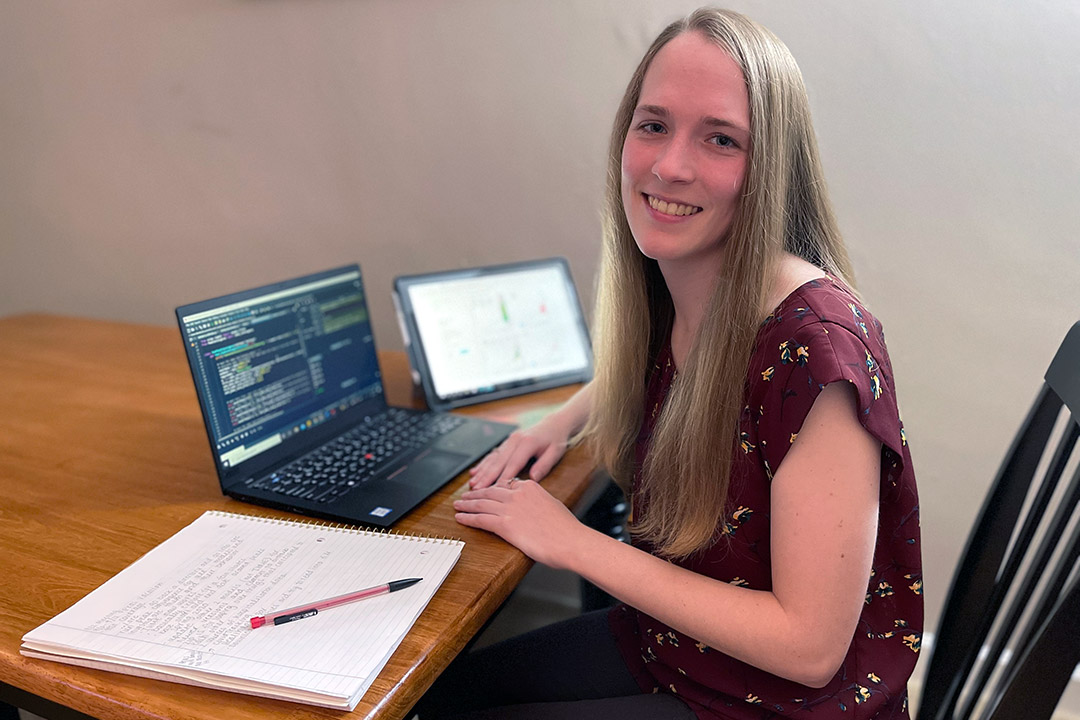Mathematical modeling Ph.D. student earns FDA fellowship
Kimberly Dautel is studying COVID-19 mathematical models and assessing predictive performance
Jeffrey Iorio
RIT mathematical modeling Ph.D. student Kimberly Dautel has earned a fellowship from the U.S. Food and Drug Administration to analyze models on the spread of COVID-19 and assess their predictive performance.
Kimberly Dautel, a mathematical modeling Ph.D. student, is undertaking COVID-19 modeling research thanks to a fellowship from the U.S. Food and Drug Administration’s Center for Devices and Radiological Health. Dautel, who is from Rochester, came to RIT after earning her undergraduate degree from another university. She credits her decision to study at RIT to the outstanding research opportunities that are available and the chance to work closely with faculty on projects that interest her.
What led you to choose RIT’s mathematical modeling Ph.D. program for your course of study?
While I was applying to various math Ph.D. programs, I saw a poster for RIT’s mathematical modeling Ph.D. program hanging up in the School of Computer Science and Mathematics building at Marist College, where I earned my undergraduate degree.
Being from Rochester, I knew how prestigious RIT was. I know RIT is well respected in the community and is well known for the quality of work its graduates do, so I decided to apply. While on winter break, I visited RIT and learned more about the program. The emphasis on mathematical modeling being the core of the program stood out to me, which I really valued, compared to other math Ph.D. programs. Ultimately, I chose RIT because of the faculty. From the moment I reached out, I felt welcomed. They were genuinely excited to meet me, listening to my interests inside and outside of the classroom. I did not feel as though I was just another prospective student, but someone they looked forward to potentially working with.
RIT’s College of Science students gain hands-on research experience. When did you get involved in research at RIT?
What’s great about the College of Science is that there are so many research opportunities available, and anyone who is interested in doing research can find something they truly enjoy. I became directly involved in research at RIT during my second year in the Ph.D. program. My project with Dr. Ephraim Agyingi modeled the impact educational campaigns have on the transmission dynamics of Ebola.
Research has demonstrated that answering one question leads to an infinite number of more unanswered questions. It has taught me to be adaptable, since there is a lot of trial and error, as well as learning as you go. Dr. Agyingi and I had weekly discussions about what is important to include in our model and the direction we wanted to focus our studies on. It was great because I had a lot of input on what I thought was important or what I thought would be interesting to analyze.
Talk about the impact that faculty have on supporting student research projects.
The program director, Dr. Nathan Cahill, helped me find a faculty member whose research interests aligned directly with mine. He led me to Dr. Agyingi, who I have had the pleasure of conducting research with from the beginning. We have ideas and then something new comes along and we have adapted. Conducting mathematical modeling research on infectious disease during the COVID-19 pandemic was a “no-brainer” and I switched my focus from Ebola to COVID-19. There are so many different paths we can take with our modeling efforts and Dr. Agyingi has allowed me to pave my own way. Currently, we are focusing on the effectiveness of masking efforts within Monroe County while also looking at the COVID-19 spread in different environments, such as school and work. The great thing about the faculty is how supportive they are along your entire research journey. Whether it is a past professor I have had, someone who I have passed frequently in the halls, or someone I have met on Zoom, the faculty take a great interest in the latest updates of student research.
Can you talk more about the FDA fellowship and what you hope to accomplish?
I am an Oak Ridge Institute for Science and Education Fellow with the U.S. Food and Drug Administration, working in the Center for Devices and Radiological Health. My fellowship involves analyzing various COVID-19 mathematical models that predict mortality, hospitalization, and demand for hospital equipment. I am evaluating the predictive capabilities of the various models and assessing model performance. Quantities of interest include how far in advance the model is predicting the peak date of hospitalization or death, and how accurate the model is in predicting the number of people hospitalized or deceased. These efforts are to create a model-based tool that will impact the center’s response to the ongoing COVID-19 pandemic and future public health emergencies.
So far, this experience has been everything I could have imagined. I attend weekly meetings that allow me to hear what research is going on throughout the FDA. I have been able to meet many people with interests and backgrounds that are different from mine, which I have found to be an extremely valuable and rewarding experience. My advisor at the FDA, Dr. Pras Pathmanathan, has been extremely resourceful.
I have learned a new programming language since starting and have a new outlook on how tremendous of an impact the uncertainty and variability of infectious disease models can have on a public health emergency. Being able to quantify how well a model’s predictive capabilities are can transform response efforts during future public health crises.
What advice can you offer to students interested in pursuing fellowships?
For students interested in fellowships, I definitely recommend to go for it and apply. There are so many research fellowships available, you’re bound to find a topic that interests you. The website, Zintellect, is extremely resourceful in searching for projects, and new opportunities are posted year-round.













